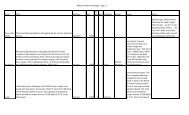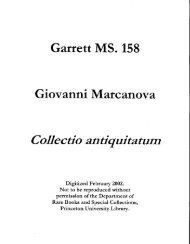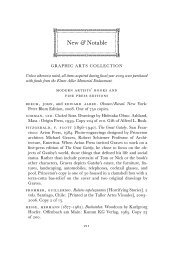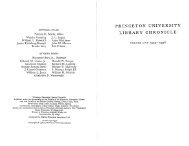You also want an ePaper? Increase the reach of your titles
YUMPU automatically turns print PDFs into web optimized ePapers that Google loves.
waves, a land of the living blessed. But at the same time the poet<br />
lets us know that this land — so small, so poor, so ancient — is<br />
scarred by a tragic history and a persistent contemporary sorrow,<br />
and its beautiful islands seem always just beyond the homesick<br />
voyager’s reach. Perhaps the most famous line in Seferis’s poetry,<br />
heard again and again in Athenian literary circles, is the one that<br />
opens a poem with the self-mocking title “In the Manner of G. S.”:<br />
“Wherever I travel Greece wounds me.” 4 The wounding is that of<br />
a bittersweet nostalgia, of a longing to return to the light by a<br />
contemporary Odyssean soul already too familiar with the darkness<br />
of the asphodel plain.<br />
Seferis’s effort to perfect his prose style also took some years, and<br />
the source of his major inspiration in this mode was a seemingly<br />
curious one. In his Nobel lecture, the poet tells us that “no other<br />
man has taught me more how to write prose” than one General<br />
Ioannis Makriyannis, who learned to write in his fashion after the<br />
age of thirty-five in order to record his experience of the Greek<br />
War of Independence and its aftermath in a mid-nineteenth century<br />
document without punctuation that, in Seferis’s view, “resembles<br />
a wall built stone by stone; all his words perform their function<br />
and have their roots; sometimes there is something Homeric in<br />
their movement.” That wall is invoked again in a lecture on<br />
Makriyannis that Seferis delivered in Alexandria, Egypt, during<br />
the Second World War, where he concludes that this writer’s “finished<br />
building” left “the imprint of the adventures of an uninterrupted<br />
human action . . . to which we give the name of style or rhythm.”<br />
Makriyannis’ model inspired Seferis to write honestly, clearly, in<br />
a personal style and rhythm that were able to forward an immense<br />
sensitivity yet without the “false pretenses of rhetoric” that his predecessor<br />
had also rejected, so that some think Seferis’s contribution<br />
to Greek prose as great as that to Greek poetry. But equally<br />
important, the Makriyannis Memoirs 5 also inspired the particular<br />
vision of the Greek spirit that Seferis carried with him as both poet<br />
and diplomat. In his Alexandria lecture, he tells us that “the content<br />
of Makriyannis’ writing is the unending and tragic struggle of<br />
a man who, deeply rooted in the instincts of his race, is striving for<br />
4 In George Seferis: Collected Poems, p. 52.<br />
5 The English translation by H. A. Lidderdale has the title Makriyannis: The Memoirs of<br />
General Makriyannis (London: Oxford University Press, 1966).<br />
363















